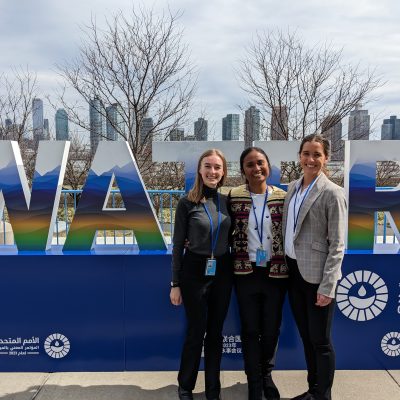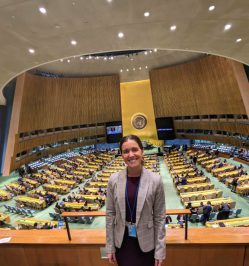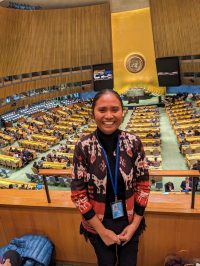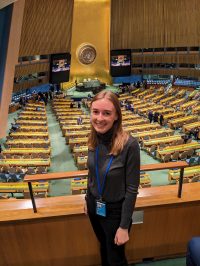Students reflect on ‘once-in-a-generation’ UN Water Conference
May 17, 2023
— By Hanna Brosky, Silvia Landa and Lucy Tantum

UNC Gillings doctoral students Lucy Tantum, Silvia Landa and Hanna Brosky outside the United Nations Secretariat Building in Manhattan, New York
The first United Nations Water Conference in almost five decades represented a once-in-a-generation opportunity for international cooperation around management of a resource that the UN’s secretary general, António Guterres, referred to as “our world’s lifeblood.” A group from the UNC Water Institute attended, including three students of the UNC Gillings School of Global Health who share their experiences below.
The conference, co-hosted by the Netherlands and Tajikistan, brought the global water community together on March 22–24, 2023, in New York City with the aim of understanding, managing and taking action toward shared water goals. Attendees tackled five themes: Water for Health; Water for Sustainable Development; Water for Climate, Resilience and Environment; Water for Cooperation; and Water Action Decade.
In the face of inevitable pressures from urbanization and global climate change, among other factors, organizers envisioned the UN 2023 Water Conference as a catalyst for progress toward the UN’s 17 Sustainable Development Goals, adopted by member states in 2015 as a “shared blueprint” for international cooperation that prioritizes the health of people and the environment. Safe water and sanitation are vital preconditions for efforts to promote health, adequate nutrition, gender equity, education, industry and the environment.
Three doctoral students in the UNC Gillings Department of Environmental Sciences and Engineering attended the conference and reflect on their experiences and takeaways from this landmark event.
Hanna Brosky: Water is everyone’s business.

Hanna Brosky
“As a doctoral student with a deep interest in water engineering, I was eager to attend this conference to gain a better understanding of the global state of water, meet experts in the field whom I respect, and listen to agenda items for the future generations of water researchers and engineers to uphold. The UN in New York City opened its doors to the global water champions, and its seats filled with indigenous representatives, UN delegates, country diplomats and leaders, and spokespeople for both nongovernmental and government organizations. I listened to many delegates of low-income countries discuss problems with affordability of water services and securing appropriate solutions that are not only for developed societies. I heard a focus on putting action to local challenges and the importance of concentrated, systematic solutions that would be inclusive to all, especially women, children and marginalized people. The closing plenary ended with a statement reinforcing how critical it is to include water in all government priorities and the assertion that ‘water is and should remain everyone’s business.’ I left the UN conference having witnessed the world fighting these wicked problems in water, and I am excited to get to work.”
Silvia Landa: Commitments to the Water Action Agenda

Silvia Landa
The UN Water Conference brought together various stakeholders to generate voluntary commitments and catalyze actions on water-related issues. Participants discussed various issues, shared key lessons, proposed strategies and made commitments to the Water Action Agenda. My research is related to government actions, and the conference was of great interest to me because it gave me the opportunity to witness country representatives making commitments at a UN meeting. Some countries made specific and tangible targets whereas others made broader commitments. It was also fascinating to see countries use this opportunity to raise awareness about their specific issues and seek support from other nations. It would be intriguing to evaluate countries’ commitments further to track which ones follow through with their promises.
Lucy Tantum: Prioritizing water as a public health problem

Lucy Tantum
The integration of water development with the strengthening of health systems emerged as a conference priority. As a student in an environmental engineering program that is housed within a public health school, I am already familiar with the ways that the environment intersects with health. Still, it was exciting to see country governments recognize safe water as an essential component of health service delivery. At the UNC Water Institute, I am involved in research to evaluate and improve access to water, sanitation and hygiene services in health care facilities. The UN Water conference led me to consider how my research can support governments not just in developing water infrastructure, but also in improving access to safe and high-quality health care more broadly.
Next steps for the water agenda
The Water Action Agenda emerged as a key outcome of the UN Water Conference, garnering more than 700 commitments to drive the transformation toward a water-secure world. The agenda reflects the global community’s commitment to addressing water challenges through a coordinated and results-driven approach. As students, we are optimistic that our research can contribute to global water development goals; particularly, we hope it will support governments in creating policies and taking actions related to water and health commitments. Furthermore, upcoming UN processes and summits will continue to follow up on the conference’s outcomes.
Discussions started at the UN Water Conference will continue this October at UNC’s annual Water and Health Conference, the world’s largest annual international conference on water and health. This conference’s focus on connecting science, policy and practice makes it an ideal forum for diverse stakeholders, not just governments, to discuss their commitments, share lessons learned and continue to find the most suitable strategies to act on their water and health commitments.
Contact the UNC Gillings School of Global Public Health communications team at sphcomm@unc.edu.
